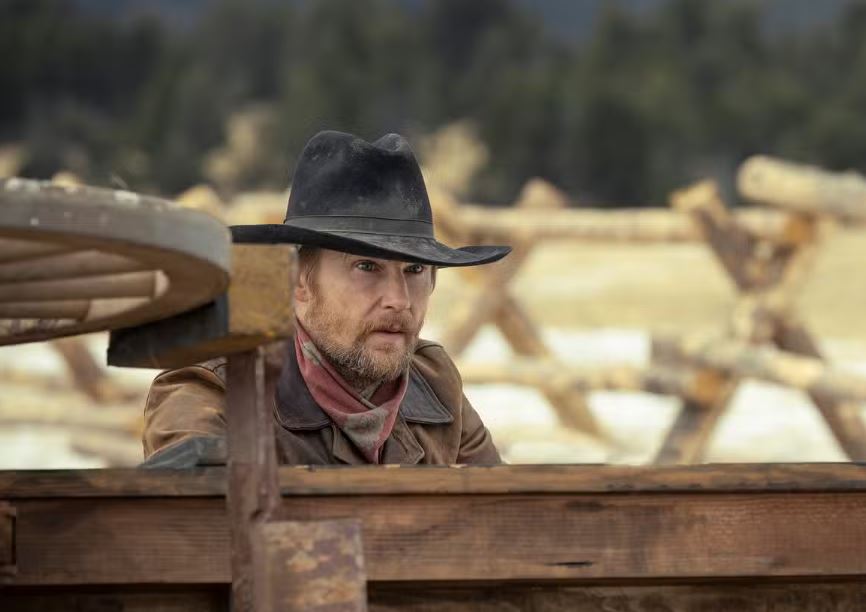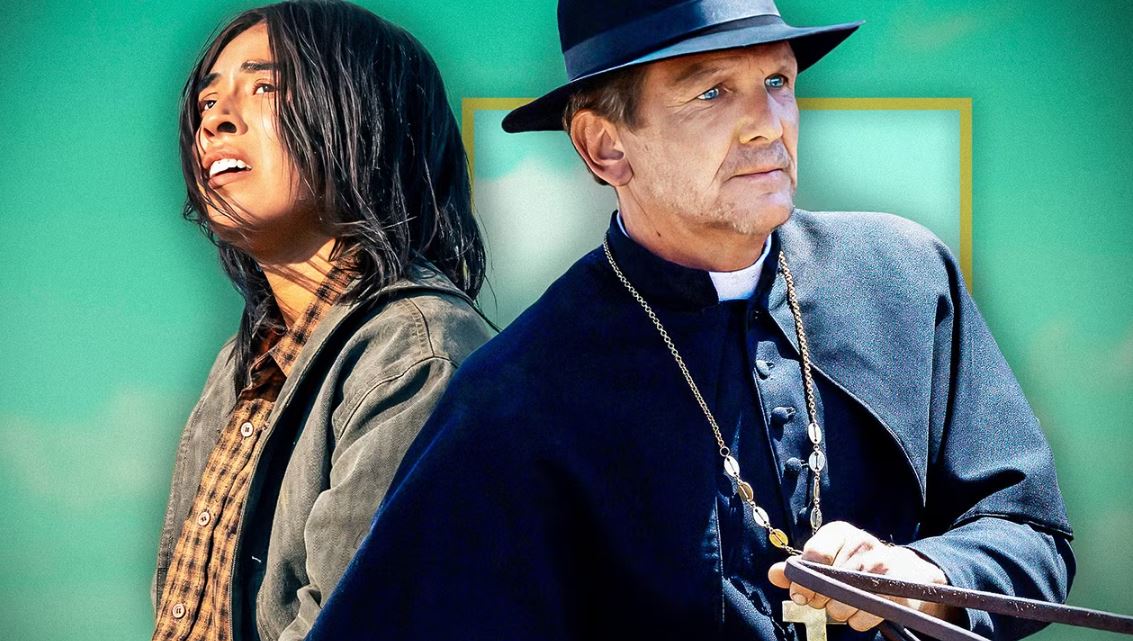While 1923 focuses on the Dutton family’s battle for their ranch, the equally important – and tragically true – story of the mistreatment of Native Americans lurks in the corners. Season 2 follows Teonna Rainwater’s escape from the assimilation school that attempted to brutally empty her of her culture, and we are forced to watch Father Renaud (Sebastian Roché) as he chases after her. Given the number of lives (and deaths) he is responsible for back at said school, it’s easy to question his singular focus on one runaway, but Roché has a controversial hot take on his character’s mindset.
Violence against Indigenous communities is not the only issue on display in 1923, as season 2 finds the Duttons still reeling from the anti-miscegenation laws that ripped Zane Davis’ (Brian Geraghty) family away from him in the season 1 finale. Davis is Jacob’s right-hand man, so weakening him by jailing his wife (for the crime of being Asian, no less) hurts the family’s ability to fend off villains like Banner and Whitfield. While the two stories are not narratively connected yet, they speak to the bankrupt morality of the West in the early 20th century.
ScreenRant interviewed Geraghty and Roché about their respective missions in 1923 season 2, though one is much more noble than the other. While Geraghty alluded to Zane’s pain at being separated from his wife and praised Harrison Ford for helping him through some vulnerable scenes, Sebastian, Roché was tasked with explaining why Father Renaud can’t leave Teonna alone.
1923 Season 2 Finds Father Renaud Seeking Salvation Through Teonna Rainwater
“His Obsession Has Turned Into A Form Of Sick Love”

Renaud’s singular focus on Teonna has not abated since she ran away, and season 2 trailers make it clear that he will go to any lengths to capture her once more. “I have a theory on that,” Roché shared confidently. “Not only is she the only person who’s resisted him, but she has actually committed crimes against the people that he represents.” Lest I point out that he certainly committed plenty of atrocities against her people, the actor added.
He has a singular obsession with her because of how strong of a character she is.
To make matters worse, the actor continued, “I suspect that his obsession has turned into a form of sick love.” Renaud’s attraction to Teonna is a sick enough thought, but there is a larger theme at play in his story. “The obsession also is for redemption. He wants to redeem her, so he can redeem himself,” Roché explained. “He wants her to forgive her sins and to reject what she represents so he can actually cleanse himself of the abuse that he subjected her and the other pupils at the school to.”
Teonna and Renaud are two sides of a very important tale in 1923, the themes of which resonate throughout much of Taylor Sheridan’s Yellowstone universe. Indigenous communities helped the land thrive until settlers stole it from them, and then those settlers in turn deemed the Natives savages. Season 2 trades in Renaud’s audacity to think he can redeem Teonna when he “basically murdered” her classmates. Roché summed up the Father’s worldview with a biting observation:
He’s someone who believes he’s doing the work of God. When you are an extremist and you normalize extremism, you do believe that you’re doing the right thing. He is someone who is very rigorous in following the word of God and applying it as law.
That’s what I found fascinating about the character in Season 1. He truly believes that he’s benefiting these children when, as an outsider, you are seeing absolute horrors subjected on these poor children. History has shown that this was, of course, the wrong thing to do, but that’s not the first time the Catholic Church has perpetuated such horrors.
Zane’s Suffering Comes With The Benefit Of Harrison Ford’s Support On Set
“I’m Just Grateful I Got To Spend Time With Him”

When it comes to Zane and his family, Geraghty revealed that there’s “no time in between” the finale of season 1 and the premiere of season 2. This means that the ranch hand is in no state to help Jacob after experiencing such a devastating separation from his loved ones. “It’s going to affect everything that I do this season,” Geraghty explained. “We see that Zane is not in a good place emotionally and physically. And so the question is, ‘How’s he going to get out of it, if he does? And what will he do?’”
While Zane has to sort himself out in order to stand up to the bankers and highway robbers encroaching on the ranch, he first shares some tender moments of mutual support with his boss. When asked about filming a particularly vulnerable scene with costar Harrison Ford at the start of the season, Geraghty was ready to gush about the venerated actor.
He’s just such a supportive actor, and he’s always there with you. We had a nice scene that was difficult; a full day of work, and he was just emphatically supportive. When we got it done, we both felt like we succeeded, and he was really complimentary. It was a dream.
I think he kissed me on the cheek and went, “Great work today!” We knew we had a lot of stakes to complete, but also just that feeling was… Well, it’s Harrison Ford! I’m just grateful I got to spend some time with him.
And he’s funny. He has a famous line: “Let’s shoot this piece of s–t!” That’s his famous line. That’s what he says, or “Acting department’s ready!” He speaks for all of us, so they know we’re ready to go. Everyone laughs, and I think they’re making a shirt about it or something.
Roché joked around with his fellow cast member, admonishing, “You’re still washing your cheek, I hope!” but there’s no denying the sincerity of Geraghty’s story. Ford is beloved on film and television sets alike, and one of the secrets to his success is the mixing of sentiment with what one might consider typical masculine energy. It’s that combination that has made Jacob Dutton such a memorable character in one short season, and it’s certainly how he will boost Zane back to fighting status in season 2.
